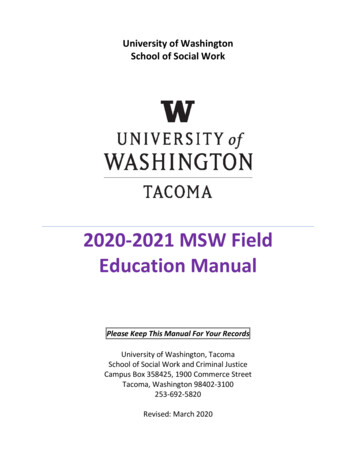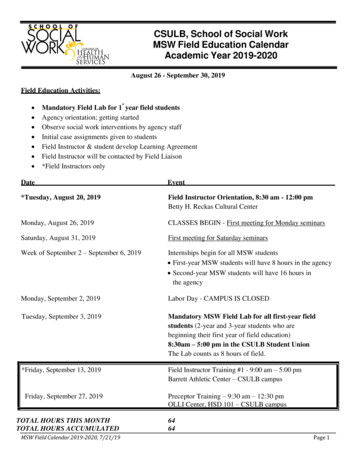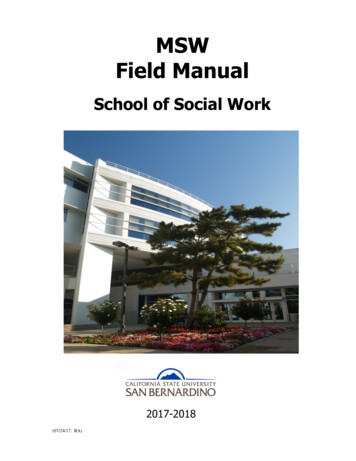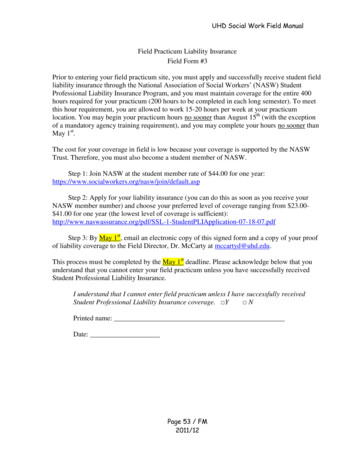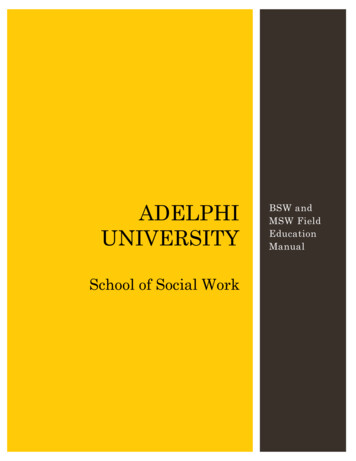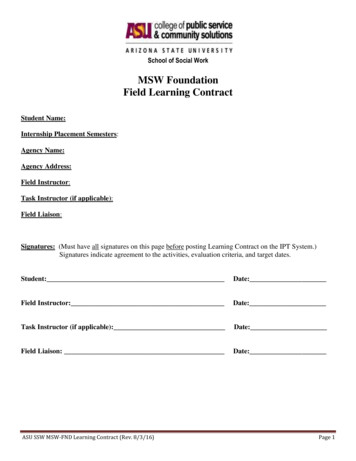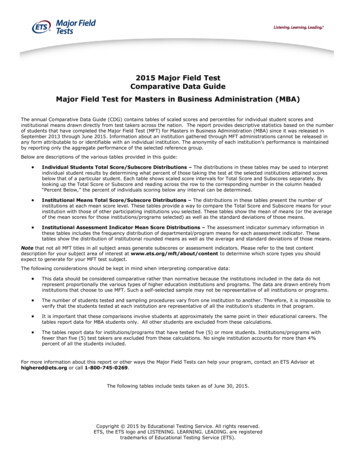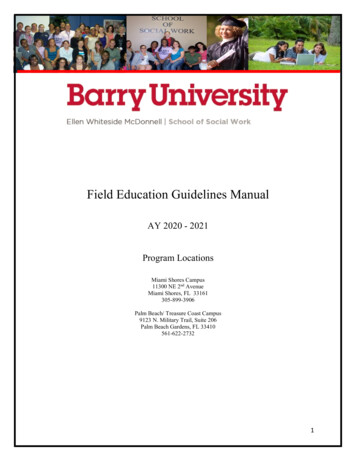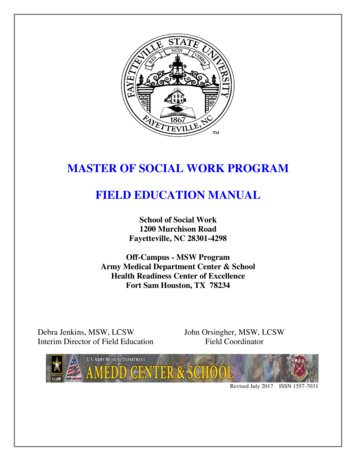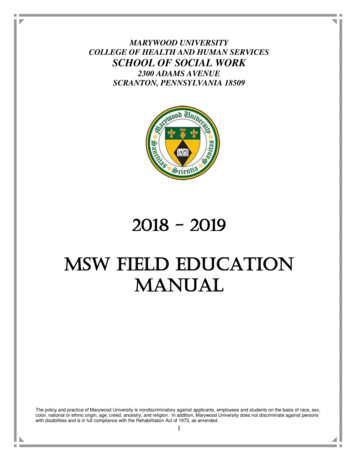
Transcription
MARYWOOD UNIVERSITYCOLLEGE OF HEALTH AND HUMAN SERVICESSCHOOL OF SOCIAL WORK2300 ADAMS AVENUESCRANTON, PENNSYLVANIA 185092018 - 2019MSW FIELD EDUCATIONMANUALThe policy and practice of Marywood University is nondiscriminatory against applicants, employees and students on the basis of race, sex,color, national or ethnic origin, age, creed, ancestry, and religion. In addition, Marywood University does not discriminate against personswith disabilities and is in full compliance with the Rehabilitation Act of 1973, as amended.1
2
Fall 2018TABLE OF CONTENTS . pages 2 -3FIELD EDUCATION CONTACT INFORMATION page 4A MESSAGE FROM THE FIELD EDUCATION DEPARTMENT . . .page 5EDUCATIONAL POLICY AND ACCREDITATION STANDARDS . pages 6 –8(EPAS CORE COMPETENCIES)ELIGIBILITY CRITERIA FOR FIELD page 9ROLES AND RESPONSIBILITIES IN FIELD EDUCATIONStudent . pages 10-11Agency Field Instructor pages 11-12Off-Site Field Instructor pages 12-13Task Supervisor . page 13Liaison pages 13-14Director of Field Education pages 14FIELD EDUCATION POLICIESPre-placement Requirements pages 15-16 Background checks Agency pre-requisite requirementsField Orientation; Preparation for Practice .page 16Field Schedule .pages 16-18 Overview of hoursWhat Field hours includeIndividual Placement ScheduleModification of Field HoursHolidays, Inclement weather, Personal/Sick DaysChange in Placement .pages 18-19Field Agency employment of Field students page 19Confidentiality . page 19 HIPPA Training requirementsTechnology and Social Media page 20Conflicts of Interest page 20Culturally Responsive Practice .pages 20-21NASW Code of Ethics .page 21Transportation to and during Field Placements pages 21-22Professional Liability Insurance .page 22SAFETY .pages 22-243
NASW Safety Policy & Procedures Guidelines for Social WorkersSUPERVISION pages 25-26FIELD EDUCATION DOCUMENTS AND DOCUMENTATION Learning Agreement .page 27Field Activity Sheet . page 27Process Recording/Journal Reflections Overview . page 28Instructional use for Process Recordings /Journal Reflections page 29General Directions for Process Recording .page 29-30General Directions Journal Reflection .page 31Reflection of Learning page 32Specialized Field Assignments . page 32Field and Agency Documentation Requirements . .page 32-33Evaluations pages 33-34Evaluation of Student PerformanceStudent Feedback FormsField Instructor Feedback formMemorandum of Understanding page 34GRADES .page 34PROBLEM SOLVING . pages 35-36Common Problems with Possible ResolutionsCONFERENCES AND WORKSHOPS page 37-38Agency Field Instructors Continuing Education BenefitsTERMINATION FROM FIELD POLICY . pages 39-40RELATIONSHIP OF FIELD PLACEMENT & SCHOOL OF SOCIAL WORK pages 41 - 43Selection of Agency SitesSelection of Agency Field InstructorsTHE PLACEMENT PROCESS pages 44-47Request for Field Placement RequirementsEmployed StudentsEmployer-based Field PlacementsFIELD EDUCATION COMMITTEE page 48FIELD EDUCATION AWARDS pages 48 -49IMPORTANT UNIVERSITY POLICIES pages 49-504
Marywood University, College of Health and Human ServicesSchool of Social Work, MSW ProgramField Education Contact InformationScranton & Central PA programsDeirdre Spelman ACSW, LSW, DirectorMarywood UniversitySSW MSW Program2300 Adams AvenueScranton, PA 18509570 348-6282 Ext 2674spelman@marywood.eduLehigh Valley and Pocono ProgramsChristina Gigler LCSW, ACSW, DirectorMarywood University SSWLehigh Valley MSW Program at DeSales University2460 Station AvenueCenter Valley, PA 18034-9568610) 282-1100 Ext 1541cgigler@marywood.eduMarywood SSW Main Office Scranton: Toll free 800 548-4898 or 570 348-6282Marywood SSW Scranton FAX: 570 961-4742Marywood University Toll Free # for other Departments: 1 -To -Marywood (1-866-627-9663)Registrar: ext. 6280Financial Aid: ext. 6255Help Desk: ext. 6760Library: ext. 6262Leigh Valley Program at DeSales University (610) 282-0479 FAX: 610 282-0328Communication:The Field Education office utilizes four different ways to disseminate information to students:1. E-mail – primary mode of communication Field education generated material willonly use student assigned Marywood e-mail addresses. Students are responsible forchecking their e-mail regularly.2. Sonia – is the field database program. You will be receiving communication through Sonia and allnecessary forms will be available on Sonia3. Student mailboxes located in the student lounge for the Scranton campus, StudentFolders at the Lehigh Valley, Student Mail Folders at the Pocono program, and Central PAStudents’ Field materials will be distributed in class.4. Home Address – It is the student’s responsibility to notify the Registrar’s office as well asthe Field Education office of any addresses or name change.5
Marywood UniversityCollege of Health and Human ServicesSCHOOL OF SOCIAL WORKA MESSAGE FROM THE MSW FIELD EDUCATION DEPARTMENTWelcome to the 2018-2019 MSW Field Education program. Field Education is an essential to social workeducation and for preparing students for professional social work practice. Field Education is a partnershipbetween the student, the Field Placement Agency and the MSW program. To assure a successful learningexperience, the Field Education Department works closely with students, Placement sites and FieldInstructors to secure a good match between students’ needs and goals and agency learning experiences.The Field Placement experiences are an integral part of social work education, providing invaluable supportin integrating classroom learning with real social work practice through learning and practicing theknowledge and skills of social work practice.Initially, most students begin their Field placement with some apprehension, this is normal; however thePlacement Field Instructor (Supervisor), Placement Task Supervisor where applicable, Faculty Liaison, andour department are available to provide support throughout this exciting experience. Each of you willdevelop a unique level of expertise as you participate in this experiential learning process, integratingtheory with practice. In your classes you are learning to know and understand, in Field you are learningto ”DO”.What can you expect from a Field Placement? Expect to learn about the populations served, about the organization and yourself. Expect to increase your skills from wherever you are starting. Expect to learn about and utilize organization and community resources. Expect to be part of your organization team and contribute to that team and be valued. Expect to put into practice classroom learning and experiences. Expect to be challenged and have opportunities to go beyond your comfort zone.What is expected from you? Be professional - dress appropriately; be dependable, prompt, respectful and receptive. Communicate with your Field Instructor, Task Supervisor, if you have one, and Liaison openly andoften. Openness to supervision, asking for and learning from feedback. Discuss any concerns you might have with your Field Instructor; bring your Liaison into theconversation if you feel your concerns are not being resolved. Work actively to develop relationships and skills.This Field Education Manual should be thoroughly read for a full understanding of the program and theField policies. It is to be used as a reference throughout the Field experience. The Field EducationDepartment welcomes dialogue and suggestions regarding Field Education, so that we may better serve ourstudents, Field Instructors and Liaisons now and in the future.We look forward to working with you and wish you a challenging, rewarding experience where you willhave the opportunity to learn and grow into professional social workers.Christina Gigler and Deirdre Spelman, Directors of Field Education6
2015 CSWE Educational Policy and Accreditation Standards (EPAS)*The purpose of the social work profession is to promote human and community well-being. Guided by a personand environment construct, a global perspective, respect for human diversity and knowledge based on scientificinquiry; social work’s purpose is actualized through its quest for social and economic justice, the prevention ofconditions that limit human rights, the elimination of poverty, and the enhancement of the quality of life for allpersons.Social work educators serve the profession through their teaching, scholarship, and service. Social workeducation—at the baccalaureate, master’s, and doctoral levels—shapes the profession’s future through theeducation of competent professionals, the generation of knowledge, and the exercise of leadership within theprofessional community.EPAS Nine Core CompetenciesCompetency-based education is an outcome performance approach to curriculum design. Competencies aremeasurable practice behaviors that are comprised of knowledge, values and skills. The goal of the outcomeapproach is to demonstrate the integration and application of the competencies in practice with individuals,families, groups, organizations and communities. The 2018-2019 Learning Agreement and Evaluation arebased on the competencies. The associated practice behaviors are found in the 2018-2019 Field EducationManual and on the 1st year Generalist Practice Field learning Agreement and Field Evaluation Forms. Studentswill develop tasks in their Field settings that will address the competencies and associated practice behaviors.Competency #1. Demonstrate Ethical and Professional Behavior.Social workers understand the value base of the profession and its ethical standards, as well as relevantlaws and regulations that may impact practice at the micro, mezzo, and macro levels. Social workersunderstand frameworks of ethical decision-making and how to apply principles of critical thinking to thoseframeworks in practice, research, and policy arenas. Social workers recognize personal values and thedistinction between personal and professional values. They also understand how their personal experiencesand affective reactions influence their professional judgment and behavior. Social workers understand theprofession’s history, its mission, and the roles and responsibilities of the profession. Social Workers alsounderstand the role of other professions when engaged in inter-professional teams. Social workersrecognize the importance of life-long learning and are committed to continually updating their skills toensure they are relevant and effective. Social workers also understand emerging forms of technology andthe ethical use of technology in social work practice.Competency # 2. Engage Diversity and Difference in Practice.Social workers understand how diversity and difference characterize and shape the human experience andare critical to the formation of identity. The dimensions of diversity are understood as the intersectionalityof multiple factors including but not limited to age, class, color, culture, disability and ability, ethnicity,gender, gender identity and expression, immigration status, marital status, race, religion/spirituality,political ideology, sex, sexual orientation, and tribal sovereign status. Social workers understand that, as aconsequence of difference, a person’s life experiences may include oppression, poverty, marginalization,and alienation as well as privilege, power, and acclaim. Social workers also understand the forms andmechanisms of oppression and discrimination and recognize the extent to which a culture’s structures andvalues, including social, economic, political, and cultural exclusions, may oppress, marginalize, alienate, orcreate privilege and power.7
Competency # 3. Advance Human Rights and Social, Economic, and Environmental Justice.Social workers understand that every person regardless of position in society has fundamental human rightssuch as freedom, safety, privacy, an adequate standard of living, health care, and education. Social workersunderstand the global interconnections of oppression and human rights violations, and are knowledgeableabout theories of human need and social justice and strategies to promote social and economic justice andhuman rights. Social workers understand strategies designed to eliminate oppressive structural barriers toensure that social goods, rights, and responsibilities are distributed equitably and that civil, political,environmental, economic, social, and cultural human rights are protected.Competency #4. Engage In Practice-informed Research and Research-informed Practice.Social workers understand quantitative and qualitative research methods and their respective roles inadvancing a science of social work and in evaluating their practice. Social workers know the principles oflogic, scientific inquiry, and culturally informed and ethical approaches to building knowledge. Socialworkers understand that evidence that informs practice derives from multi-disciplinary sources andmultiple ways of knowing. They also understand the processes for translating research findings intoeffective practice.Competency # 5. Engage in Policy Practice.Social workers understand that human rights and social justice, as well as social welfare and services, aremediated by policy and its implementation at the federal, state, and local levels. Social workers understandthe history and current structures of social policies and services, the role of policy in service delivery, andthe role of practice in policy development. Social workers understand their role in policy development andimplementation within their practice settings at the micro, mezzo, and macro levels and they activelyengage in policy practice to effect change within those settings. Social workers recognize and understandthe historical, social, cultural, economic, organizational, environmental, and global influences that affectsocial policy. They are also knowledgeable about policy formulation, analysis, implementation, andevaluation.Competency # 6. Engage with Individuals, Families, Groups, Organizations, and Communities.Social workers understand that engagement is an ongoing component of the dynamic and interactiveprocess of social work practice with, and on behalf of, diverse individuals, families, groups, organizations,and communities. Social workers value the importance ofhuman relationships. Social workers understand theories of human behavior and the social environment,and critically evaluate and apply this knowledge to facilitate engagement with clients and constituencies,including individuals, families, groups, organizations, and communities. Social workers understandstrategies to engage diverse clients and constituencies to advance practice effectiveness. Social workersunderstand how their personal experiences and affective reactions may impact their ability to effectivelyengage with diverse clients and constituencies. Social workers value principles of relationship-building andinter-professional collaboration to facilitate engagement with clients, constituencies, and otherprofessionals as appropriate.Competency # 7. Assess Individuals, Families, Groups, Organizations, and Communities.Social workers understand that assessment is an ongoing component of the dynamic and interactive processof social work practice with, and on behalf of, diverse individuals, families, groups, organizations, andcommunities. Social workers understand theories of human behavior and the social environment, andcritically evaluate and apply this knowledge in the assessment of diverse clients and constituencies,including individuals, families, groups, organizations, and communities. Social workers understandmethods of assessment with diverse clients and constituencies to advance practice effectiveness. Socialworkers recognize the implications of the larger practice context in the assessment process and value theimportance of inter-professional collaboration in this process. Social workers understand how their personalexperiences and affective reactions may affect their assessment and decision-making.8
Competency # 8. Intervene with Individuals, Families, Groups, Organizations, and Communities.Social workers understand that intervention is an ongoing component of the dynamic and interactiveprocess of social work practice with, and on behalf of, diverse individuals, families, groups, organizations,and communities. Social workers are knowledgeable about evidence-informed interventions to achieve thegoals of clients and constituencies, including individuals, families, groups, organizations, and communities.Social workers understand theories of human behavior and the social environment, and critically evaluateand apply this knowledge to effectively intervene with clients and constituencies. Social workersunderstand methods of identifying, analyzing and implementing evidence-informed interventions toachieve client and constituency goals. Social workers value the importance of inter-professional teamworkand communication in interventions, recognizing that beneficial outcomes may require interdisciplinary,inter-professional, and inter-organizational collaboration.Competency # 9. Evaluate Practice with Individuals, Families, Groups, Organizations, and Communities.Social workers understand that evaluation is an ongoing component of the dynamic and interactive processof social work practice with, and on behalf of, diverse individuals, families, groups, organizations andcommunities. Social workers recognize the importance of evaluating processes and outcomes to advancepractice, policy, and service delivery effectiveness. Social workers understand theories of human behaviorand the social environment, and critically evaluate and apply this knowledge in evaluating outcomes. Socialworkers understand qualitative and quantitative methods for evaluating outcomes and practiceeffectiveness.*Copyright 2015, Council on Social Work Education, Inc.9
ELIGIBILITY CRITERIA FOR FIELDStudents will have met the basic criteria for admission to the MSW program and be admitted to the MSWprogram prior to assignment to an agency for placement. Students cannot receive academic credit for life or workexperience for any portion of fieldwork.Prior to beginning a Field Placement all students complete a Request for Field placement portfolio packet andan individual interview with the Field Education office. In addition, students must be completing or havecompleted the necessary courses to be eligible for Field assignment.To begin 1st year Generalist Practice field experience, Field I SW 591, Full-time students must beconcurrently taking SW 601 HBSE, SW 801 Social Welfare Policy I, SW 701 Research I and SW 501 SocialWork Practice I with Field I SW 591. Students must pass SW 591 and SW 501 to enroll in SW 592. Studentsmust successfully complete the first year of Field and meet all the above criteria to do an Advanced SpecializedPractice placement (SW 595 and SW 596).To begin 1st year Generalist Practice field experience Field I SW 591, Part-time students must havesuccessfully completed SW 601 HBSE I, SW 971 Ethics and SW 801 Social Welfare Policy I and be enrolledconcurrently in SW 501 Social Work Practice I. Students must pass SW 591 and SW 501 to enroll in SW 592.Students must successfully complete the first year of Field and meet all the above criteria to do an AdvancedSpecialized Practice placement (SW 595 and SW 596).To
Leigh Valley Program at DeSales University (610) 282-0479 FAX: 610 282-0328 Communication: The Field Education office utilizes four different ways to disseminate information to students: 1. E-mail – primary mode of communication Field education generated material will only use student assigned Marywood e-mail addresses.
